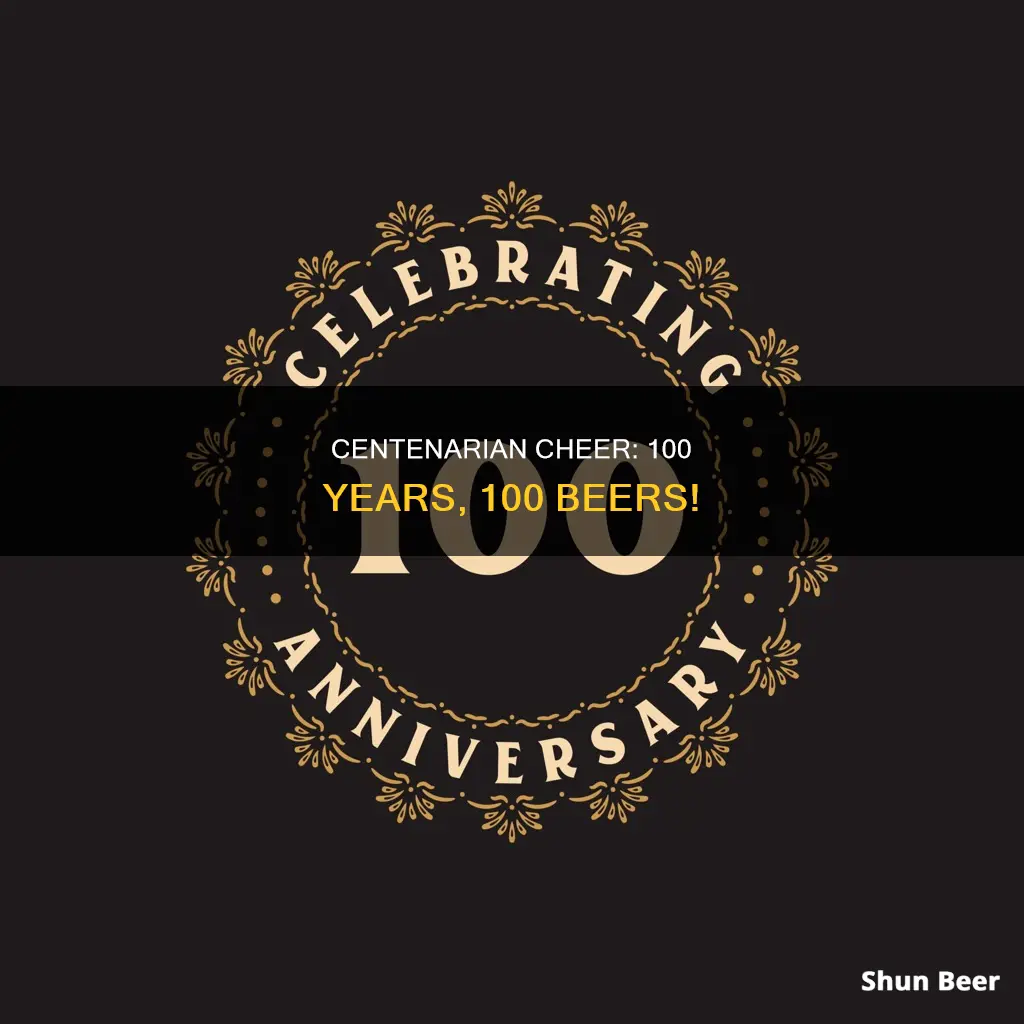
May you live a hundred years, may you drink a hundred beers is a popular toast, often used to wish someone a long and happy life. The phrase is believed to have originated in Eastern Europe, where drinking beer is a common social activity. In this context, drinking beer is seen as a symbol of celebration and camaraderie, adding a playful tone to the well-wisher's sentiment. While the exact origins of this saying remain unknown, its enduring popularity highlights the universal desire to find joy and meaning in life, often through shared experiences with loved ones.
| Characteristics | Values |
|---|---|
| Type | Birthday song |
| Tone | Humorous |
| Theme | Long life, drinking, celebration |
| Lyrics | May you live a (hundred) thousand years, may you drink a (hundred) thousand/million beers, get plastered, you bastard, happy birthday to you |
| Language | English |
What You'll Learn

Long life and good health
The phrase "may you live 100 years, may you drink 100 beers" is a playful twist on traditional birthday blessings. It is often used as a lighthearted birthday song or toast, wishing the recipient a long life and good health, but with a humorous edge.
This phrase is a modern adaptation, with its roots in the traditional Polish song, "Sto Lat", which translates to "One Hundred Years". "Sto Lat" is used to express good wishes, health, and longevity, and is a common way to celebrate birthdays in Poland, as well as being an integral part of Polish immigrant culture. The song is often followed by "Niech im gwiazdka pomyślności", which references alcohol consumption and is therefore excluded from children's parties.
The "100 years, 100 beers" phraseology takes this traditional concept of wishing longevity and adds a playful, colloquial element. The song wishes the recipient a long life, but also a fun one, filled with drinks and good times. It is a way to celebrate the birthday of an individual, often with a sense of humour that is tailored to the recipient's personality.
The phrase has been adapted and personalised in various ways. For example, some versions change the number of years and beers to "a thousand", or "one million". The song can also be adapted to suit the recipient, such as the version sung by a choir director: "May you live a thousand years, may you direct a thousand choirs, get plastered, you bastard, happy birthday to you".
These adaptations all stem from the traditional concept of wishing someone a long and happy life, but with a fun and modern twist. "May you live 100 years, may you drink 100 beers" is a lighthearted way to celebrate a birthday and wish someone good health and longevity, with a humorous, personal edge.
Breastfeeding and Beer: Is It Safe to Drink Alcohol?
You may want to see also

Drinking culture in birthday songs
Birthday celebrations vary across the world, but a common feature is the singing of songs to celebrate the occasion. The most well-known song is "Happy Birthday to You", which has been a birthday tradition in English-speaking countries for over a century. However, there are many other songs that are sung at birthday celebrations, some of which reference drinking.
"Sto Lat" is a traditional Polish song that is sung to wish someone a long life and good health. It is often used to wish someone a happy birthday and is comparable to "Happy Birthday to You" or "For He's a Jolly Good Fellow". The song is performed at both informal and formal events, including birthdays, weddings, and state events. While the exact origin of the song is unknown, it has become an integral part of Polish immigrant culture. One of the few variations of the song includes the line "And whoever won't sing/drink with us/May they sleep under the table/May they sleep under the table". This variation highlights how the song encourages drinking as a way to celebrate and connect with others.
In English-speaking countries, there is a less conventional birthday song that begins with the line "May you live a thousand years/May you drink a thousand beers". This song, set to the tune of "Happy Birthday to You", playfully wishes the celebrant a long life and abundant drinks. The lighthearted tone of the song, with its use of colloquial terms like "get plastered" and "you bastard", creates a fun and informal atmosphere.
Birthday songs that reference drinking, such as "Sto Lat" and the unconventional "Happy Birthday" variation, reflect a drinking culture where alcohol is seen as a way to celebrate and bond with others. These songs encourage a festive and indulgent mindset, toasting to the health and longevity of the birthday celebrant.
While "Happy Birthday to You" remains the most popular birthday song, these alternative songs showcase the diverse ways people choose to celebrate, incorporating humour, tradition, and cultural influences.
Beer O'Clock: When Work Lunches Need a Lift
You may want to see also

Traditional birthday songs
The phrase "May you live 100 years, may you drink 100 beers" is a play on the traditional Polish song "Sto lat" (One Hundred Years), which is sung to wish someone a long and prosperous life. The song is often used as a birthday greeting and to toast someone's health. The English translation of the Polish lyrics is:
> 100 years, 100 years, May they live! 100 years, 100 years, May they live! Once again, once again, May they live! May they live!
The song has also been adapted and modified over time, with people adding their own creative and humorous verses. For example, the blog "The Dilettante's Dilemma" mentions a variation that goes:
> May you live a thousand years, May you drink a thousand beers, Get plastered, You bastard, Happy birthday to you.
This version adds a playful and colloquial twist to the traditional song, incorporating drinking culture and a lighthearted insult.
- "Happy Birthday to You": This is the most well-known and traditional birthday song in English-speaking countries. It has been a birthday tradition for over a century and was first written by Mildred and Patty Smith Hill in 1893.
- "Birthday" by The Beatles: A rock-heavy track from their 1968 White Album that is sure to get people of all ages on the dance floor.
- "Happy Birthday" by Stevie Wonder: A funky track with an earworm chorus that could be a great replacement for the traditional birthday tune.
- "Birthday Cake" by Rihanna: This song has a hypnotic beat that will get everyone on their feet and clapping along.
- "In Da Club" by 50 Cent: This celebratory song is a perfect party starter and has spent nine weeks at No. 1 on the Billboard Hot 100.
- "Birthday" by Katy Perry: A dance-inducing track that will make you wish it was your birthday every day.
These songs, both traditional and modern, are a testament to the universal appeal of music in marking life's milestones and celebrating the joy of birthdays.
Melatonin and Beer: Is It Safe to Mix?
You may want to see also

Variations of birthday songs
There are many variations of birthday songs that are sung around the world, and some are more popular than the traditional "Happy Birthday" song.
In the US, for example, a popular variation includes the lyrics: "May you live one hundred years/May you drink one million beers/Get plastered you bastard/Happy Birthday to you". This version is also sung in the UK and Ireland, where it is often sung by older generations.
In Germany, "Geburtstagskind, Geburtstagskind" is sung in schools to celebrate students' birthdays, although it is not a traditional song. In the Netherlands, "Lang Zal Ze Leven" is the traditional birthday song.
In Greece, birthday songs include the following lyrics: "Χρόνια πολλά/Να ζήσεις _____ και χρόνια πολλά, μεγάλος, -η να γίνεις με άσπρα μαλλιά/Παντού να σκορπίζεις της γνώσης το φως και όλοι να λένε να ένας/μία σοφός", which translates to: "Happy Birthday (literally: many years)/May you live (name), and many years, may you become old with white hair/May you spread the light of knowledge everywhere/And may everyone say, here is a wise one".
Birthday songs can also be more sombre, such as the Sacred Harp song, which includes the lyrics: "Youth, like the spring, will soon be gone/By fleeting time or conqu’ring death/Your morning sun may set at noon/And leave you ever in the dark".
Some birthday songs are more humorous, such as the song sung by members of the Society for Creative Anachronism, which includes the lyrics: "Why was he born so beautiful?/Why was he born at all?/He’s no bloody good to anyone/He’s no bloody use at all!".
In conclusion, there are many variations of birthday songs, and they can include humour, blessings, and reflections on mortality.
Leftover Beer: Safe to Drink or Not?
You may want to see also

International birthday songs
Poland
In Poland, "Sto lat" (which translates to "One Hundred Years") is a traditional song used to express good wishes, good health, and long life to a person. It is commonly sung at birthdays, name days, weddings, and other formal and informal gatherings. The song is often followed by "Niech im gwiazdka pomyślności," excluding children's parties, as this song references alcohol consumption. The phrase "Sto lat!" is also used as a toast and to acknowledge someone's sneezing, similar to "Bless you" in other cultures.
Germany
Germans sing "Geburtstagskind," which translates to "Birthday Child," to celebrate a person's birthday. This song is about gathering together to wish someone a happy new year. Another German birthday song is "Viel Glück und viel Segen," which expresses wishes for luck and blessings.
Netherlands
In the Netherlands, the traditional birthday song is "Lang Zal Ze Leven," which translates to "Long Shall She Live."
Greece
In Greece, birthday songs include wishes for the person to live a long life and become wise, spreading the light of knowledge.
Mexico
Las Mañanitas is a classic Mexican birthday song. It is not uncommon to send a Mariachi band to serenade someone on their birthday.
Quebec and Francophone Canada
Gens du Pays, a sovereigntist anthem, is often sung as a birthday song in Quebec and some other Francophone communities in Canada.
United States
In the US, there are various birthday songs and traditions, including appending a humorous chorus to the traditional "Happy Birthday" song: "Why was he born so beautiful? Why was he born at all? He's no bloody good to anyone. He's no bloody use at all!" Another tradition is to sing a modified version of "Happy Birthday," wishing the person a "happy, crappy birthday" and acknowledging their survival of another year.
Additionally, a lighthearted and humorous birthday song that has gained some popularity in the US is "May you live one hundred years / May you drink one million beers / Get plastered, you bastard / Happy birthday to you." This song plays on the traditional blessing structure and tone but takes a comedic turn, adding a touch of informality and fun to birthday celebrations.
Drinking Beer on Virginia Beach: What's the Deal?
You may want to see also
Frequently asked questions
It's a way to wish someone a long and happy life, filled with fun and celebration.
No, it is typically said to close friends and family, and often during a celebration like a birthday or anniversary.
It's hard to say exactly, but it likely originated from a culture that values both longevity and the enjoyment of beer.
Yes, it would be considerate to thank the person and perhaps offer a return wish of good health and happiness.







